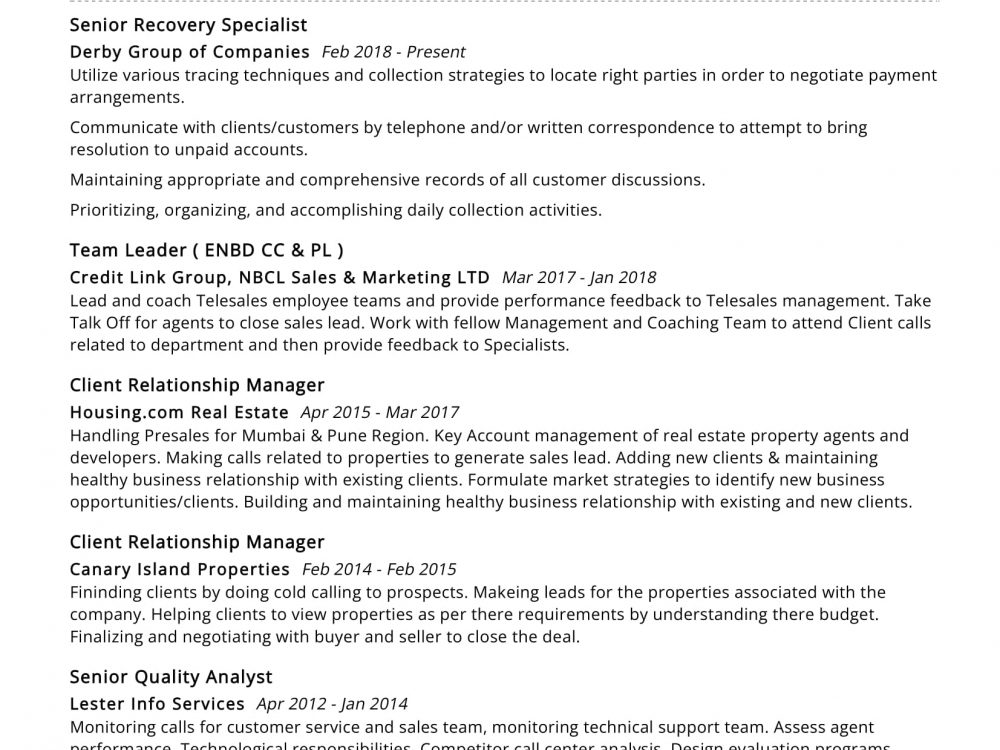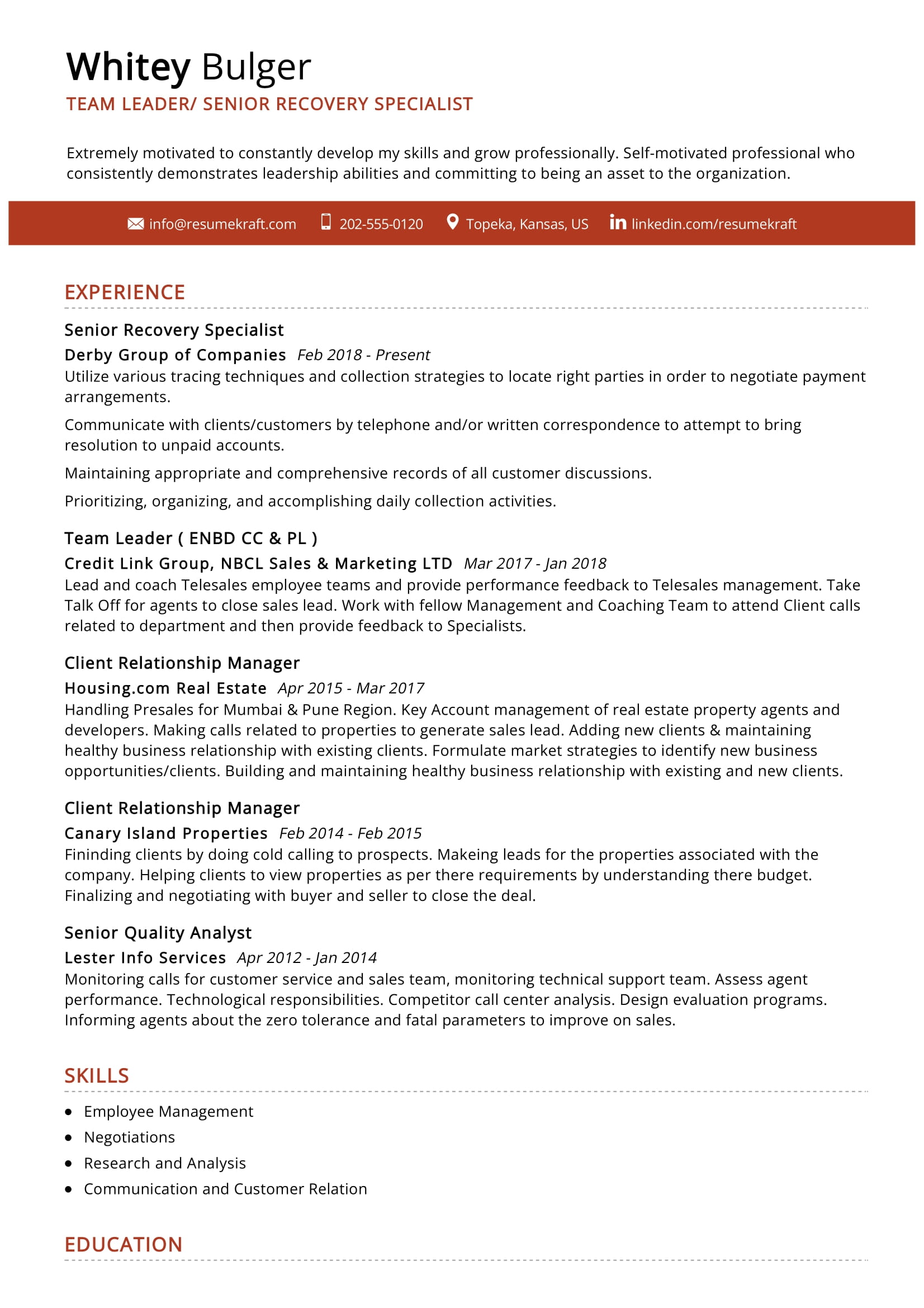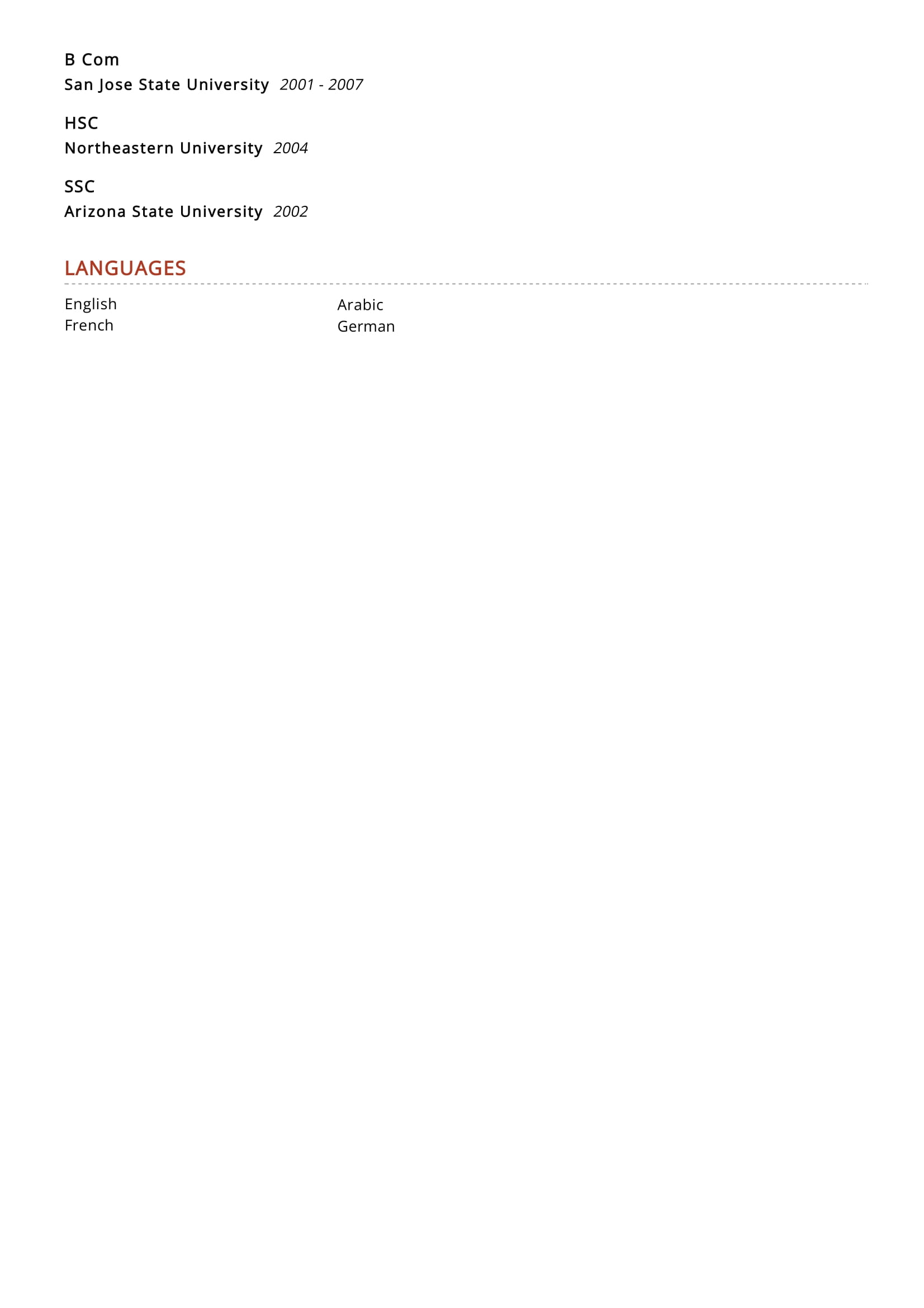What Should Be Included In A Recovery Specialist Resume?
When writing a resume for a role as a recovery specialist, it is important to focus on the skills, experience, and qualifications that make you an ideal candidate for the position. Your resume should highlight your ability to successfully handle complex cases and provide support to individuals who are experiencing addiction and other issues. It should also show your knowledge of recovery strategies and techniques, your experience with various types of interventions, and your ability to collaborate with other professionals.
When listing your qualifications, start by describing your educational background. Include any degrees, certifications, or other qualifications that are related to the role. Additionally, detail any experience you have working with individuals who are struggling with addiction and mental health issues. Highlight any relevant work experience, such as treating clients, running group therapy sessions, or leading interventions.
When listing your skills, include both technical and soft skills. Focus on your ability to build rapport with clients, your communication skills, and your knowledge of various treatment models. Additionally, highlight any relevant technical skills that relate to the role, such as knowledge of software applications, data entry, or report preparation.
Finally, include any additional skills that are relevant to the position, such as problem-solving, conflict resolution, or critical thinking. Ultimately, your resume should be tailored to the specific role you are applying for, so it is important to make sure that your skills and experience are clearly highlighted in the best way possible.
What Skills Should I Put On My Resume For Recovery Specialist?
When writing a resume for a Recovery Specialist position, it’s important to showcase the skills and qualities that make you the most qualified candidate. As a Recovery Specialist, you will be responsible for supporting people dealing with addiction, mental health issues, and other challenging behaviors. In order to be successful in this role, you must have a good understanding of the recovery process and be able to provide emotional and moral support.
When creating your resume, be sure to include the following skills that are essential for success in this role:
- Knowledge of Substance Abuse and Mental Health: A successful recovery specialist will have a solid understanding of the substance abuse and mental health continuum. This includes knowledge of different types of substances, addiction, treatment approaches, and how to support individuals in recovery. Additionally, it’s important to have a good understanding of trauma and how it can affect an individual’s recovery process.
- Empathy and Compassion: In this role, it’s essential to be able to provide emotional support to individuals in recovery. Your resume should demonstrate your ability to empathize with someone going through a difficult time, as well as your ability to provide compassion and understanding.
- Strong Communication and Interpersonal Skills: You will need to be able to effectively communicate with individuals in recovery, as well as their families and other stakeholders. This includes being able to listen, understand, and support those in need. Additionally, you must be able to work well with other professionals and be able to collaborate with them to ensure the best possible outcomes.
- Problem-Solving and Conflict Resolution: Recovery can be a difficult process and you will need to be able to think critically and strategically in order to help those in need. You must be able to analyze situations and create solutions that are both beneficial to the individual and respectful of the wishes of the family, friends, and other stakeholders. Additionally, you must be able to navigate challenging conversations and scenarios and be able to resolve conflicts and disagreements in a constructive and respectful manner.
What Is The Job Description Of The Recovery Specialist?
The Recovery Specialist is a career path that requires a combination of knowledge and expertise in order to excel. This role is responsible for providing assistance to individuals who have been affected by some form of drug addiction or substance abuse, as well as helping them transition back into their daily lives. As a Recovery Specialist, you must understand the individual’s needs and be able to create an effective plan for them to recover. This position requires excellent communication and problem-solving skills, as well as the ability to build trust with clients.
Your job description may include interviewing and assessing potential clients, creating individualized treatment plans, and providing support throughout the recovery process. This role involves monitoring client progress and providing feedback, as well as providing ongoing support for relapse prevention. As a Recovery Specialist, it is essential to have a clear understanding of the dynamics of addiction and substance abuse, as well as their effects on individuals and their families.
You will also be responsible for coordinating with other mental health professionals, such as psychiatrists and psychologists, to ensure the best possible outcome for the client. It is important to have a good understanding of various treatment methods and therapies, including cognitive behavioral therapy and other evidence-based approaches. Additionally, Recovery Specialists must be able to teach clients healthy life skills that can help them in their recovery.
The Recovery Specialist must also be knowledgeable in the legal system and understand the implications of addiction and substance abuse. This includes having an understanding of the laws and regulations related to these issues. Furthermore, you must be able to handle difficult situations, remain patient in stressful situations, and have excellent communication and interpersonal skills. Recovery Specialists must also be willing to work with different types of clients, including those with severe addictions and those who don’t want to admit they have a problem.
Recovery Specialists must have a deep understanding of the causes, signs, and symptoms of addiction and substance abuse. They must also be knowledgeable about the various treatment methods available and understand the psychological and physiological effects of addiction. Additionally, Recovery Specialists must be familiar with the principles of relapse prevention and be able to provide education, support, and guidance to those in recovery. They must also be able to develop individualized treatment plans for each client based on the client’s needs and goals. Recovery Specialists must be able to recognize and assess the signs and symptoms of addiction and substance abuse, as well as be knowledgeable about the various treatment methods available. They must understand the psychological and physiological effects of addiction, and be familiar with the principles of relapse prevention.
What Is A Good Objective For A Recovery Specialist Resume?
When it comes to writing a recovery specialist resume, it’s important to have a good objective that will help you stand out from the rest of the applicants. An effective objective should clearly state what you are able to contribute to the organization. It should also demonstrate that you have the skills and experience needed to successfully fill the role. A good objective should be concise and strongly communicate your value as a potential employee.
When crafting your objective, it’s important to keep in mind the specific needs of the job you are applying for. Consider the type of recovery specialist job you’re applying for and what skills, qualifications and experience it requires. Be sure to highlight any relevant experience, education and training. If you have any special qualifications or skills that are relevant to the role, you should also mention them in your objective.
When writing your objective, be sure to use language that conveys confidence in your capabilities. Also, make sure to avoid using language that is too vague or general. It’s important to be specific about the skills and experience you have that will be beneficial to the organization.
Finally, be sure to keep your objective to one or two sentences so that it is easy to read and digest. A good objective should be clear and concise and should leave a positive impression on the reader. With a well-crafted objective, you can demonstrate to employers that you have what it takes to excel in the role of a recovery specialist.
What Are The Career Prospects In The Recovery Specialist?
A career in the recovery specialist field is both rewarding and challenging. The role of the recovery specialist is to provide guidance and assistance to individuals suffering from an addiction or mental health disorder in order to help them achieve their recovery goals. This can include providing counseling, developing treatment plans, and facilitating support groups. A successful recovery specialist will have excellent communication skills, a passion for helping others, and a strong understanding of the recovery process.
The job outlook for recovery specialists is quite strong. According to the U.S. Bureau of Labor Statistics, the employment of substance abuse, behavioral disorder, and mental health counselors is projected to grow by 22% from 2019 to 2029 – much faster than the average of all occupations. This growth is due to an increased awareness of the need for mental health and substance abuse treatment, as well as an increased demand for services.
The job opportunities for recovery specialists vary greatly depending on the type of facility you work for and the location. For example, in some states, there are specialized treatment centers that provide residential and inpatient services to individuals with substance abuse disorders. Other states may offer outpatient services, such as counseling and group therapy. There are also opportunities to work in private practice, hospitals, or school districts.
Overall, a career in the recovery specialist field is both rewarding and challenging. With the right qualifications and support, a recovery specialist can make a real difference in people’s lives and help them reach their full potential. The average salary for a recovery specialist is around $76,000 per year, depending on experience, qualifications, and the type of facility. In addition to a competitive salary, some recovery specialist positions may offer benefits, including health insurance, paid time off, and other forms of compensation such as tuition reimbursement. With these benefits, a recovery specialist can have a secure career with good job security and the potential for career growth.
Key Takeaways for an Recovery Specialist resume
When writing a resume for a Recovery Specialist role, it is important to keep these key takeaways in mind. First, your resume should reflect your understanding of the Recovery Specialist role and your ability to carry out related tasks. Make sure to highlight any relevant experience or certifications in the resume to demonstrate your suitability for the position. Additionally, your resume should be tailored for each specific job application, so be sure to tailor your resume for each job you apply for.
It is also important to focus on the key aspects of the Recovery Specialist role, which include emergency preparedness, crisis management, and community resilience. Your resume should demonstrate your knowledge in these areas and your ability to apply that knowledge to various situations. In addition, your resume should also demonstrate your problem-solving and organizational skills, as well as your ability to work well with diverse groups of stakeholders.
Finally, it is important to include strong, clear language in your resume. Be sure to use clear, concise language that is easy for a hiring manager to read and understand. Additionally, you should avoid over-explaining or using too many buzzwords, as this may confuse the hiring manager and portray you as someone who is not well-versed in the Recovery Specialist role. By following these key takeaways, you can create a resume that will stand out from the competition and help you land the Recovery Specialist role you are seeking.



